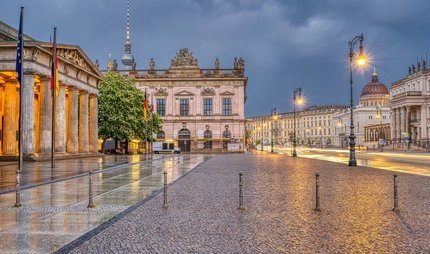
Komische Oper Berlin @ Schillertheater
Lively music theatre with tradition
The Komische Oper in Berlin performs all facets of musical theatre, sometimes with depth, sometimes with intoxicating lightness. The main theatre in Behrenstraße is currently being renovated, but the programme is full of surprises.
The reputation is justified: The Komische Oper Berlin is considered one of the most innovative theatres on the opera scene.
Glamour and humour in Berlin for many decades
Since it was founded in 1947 as the "Volksoper", it has continued to appeal to everyone, not just theatre connoisseurs. The key to this is its comprehensive and diverse programme, which ranges from operas to musicals, from operettas and concerts to children's operas. There is also an inspiring education programme that aims to reach and bring together audiences from all sections of the population.
When founding father Walter Felsenstein created the name "Komische Oper", he drew on the immediacy and popular appeal of the French Opéra comique. To this day, the house stands for glamour and wit, for lightness and depth and serves as a place of encounter and exchange - in other words, intelligent entertainment of the highest possible excellence.
Exciting new locations during the refurbishment

"Out into the city, into the neighbourhoods!"
Anyone who goes travelling gets to know new things, experiences adventures and encounters unknown worlds - the Komische Oper Berlin's outdated main theatre in Behrenstraße has been undergoing refurbishment, renovation and expansion since August 2023, making it fit for the future. Meanwhile, the programme will not remain empty. The variety of different locations where the Komische Oper stages its programme is exciting:During the renovation period, there will not only be performances in the interim venue, the Schillertheater, but also at Tempelhof Airport, the Kindl-Areal, in a tent in the middle of Berlin and in the city's many neighbourhoods.
Susanne Moser and Philip Bröking are co-directors, while James Gaffigan is general music director. They stand for diverse, courageous and lively music theatre, sometimes serious, sometimes light, from baroque opera to the festival for new music theatre "Schall&Rausch".
Box office opening hours: Opera box office @Schillertheater
Bismarckstraße 110
10625 Berlin
Wed, Thu & Fri 4-6pm
Ticket payment only



